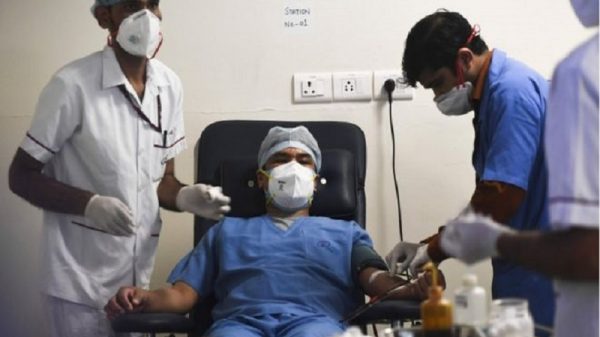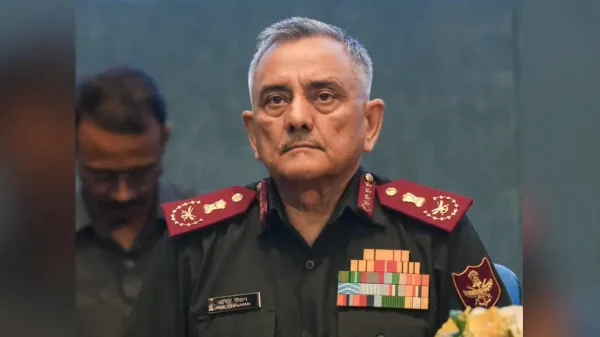The family doctor checked on him and advised that they wait for a few hours for him to stabilise. But in the early hours, his blood oxygen level had fallen and he had to be rushed to a hospital in Delhi. He was also running high fever.
His condition continued to deteriorate and the doctor asked the family for permission to give him convalescent plasma – one of several investigational therapies being tried in India. in response to the coronavirus pandemic.The therapy, which uses the plasma of recovered Covid-19 patients, requires consent from patients and their families.
When people have Covid-19 or other viral diseases, their immune system responds by creating antibodies, which attack the virus. Over time the antibodies build up and can be found in plasma – the liquid portion of the blood.
Plasma therapy is not new. German physiologist Emil von Behring won Nobel Prize in 1901 for using it to treat diphtheria. It was also used during the Spanish Flu in 1918.
Mr Mal’s family gave consent but the hospital didn’t have donors and asked them to find one. “We didn’t know where to start, so we called everybody we knew and posted a plea on social media,” he says.
They eventually found a donor and the patient survived – but the experience left them shattered. Mr Mal’s family struggled because not many patients who had recovered from Covid-19 were willing to go back to the hospital to donate plasma.
Nearly two months later, the gap between plasma’s demand and supply has grown even bigger. Many Indian states have asked hospitals to take part in clinical trials. But some states appear more eager than others.Maharashtra and Delhi – two among the worst-affected states in India – have not only backed the therapy, but have set up plasma banks as well.
Doctors are also allowed to prescribe the therapy to moderate patients who don’t show improvement with other treatments.
Dozens of studies are being conducted on the therapy around the world. But experts have warned that it’s no magic bullet. Doctors around the world have not rejected the idea but say initial results of the ongoing studies are not conclusive.
Delhi-based virologist Dr Shahid Jameel says it’s too soon to have any definitive conclusions whether the therapy can be considered as a proven cure.
“Such studies require prolonged clinical trials among a large and varied group of people and then you need time to assess those results,” he says.
One of the earlier studies was done in China and it showed positive clinical improvement. But it also noted that all patients who recovered in the trial also received a variety of therapies in addition to plasma.
Prof Anthony Gordon, who is the head of critical care at Imperial College London and is leading a clinical trial in the UK, believes that “we don’t know for sure if it works at the moment”.
While most countries are taking a cautious approach to the therapy, India appears to be not only putting faith in it but politicians have actively publicised it a as a life-saving treatment. And this has put pressure on physicians in the country.
Dr Sushila Kataria, director of intensive care at Medanta Hospital, says more and more patients and their relatives are now asking for plasma therapy.
She says it’s been “hyped too much” and people have started taking it as a proven treatment.
Dr A Fathudden, head of critical care at Ernakulam Medical College, also says the therapy’s effectiveness is yet to be proven.
“It should not be given beyond the scope of clinical trials at the moment. We need more data and understanding. Under no circumstances, families should be told that this therapy is a magic wand,” he says.
But despite the cautious approach, the demand for plasma from recovered Covid-19 patients in India has soared in the past few weeks. And it was this growing demand that made Mr Mal launch his website Dhoond, which aims to match donors with patients.
“My own experience made me realise that this gap needed to be fulfilled. But there were so many challenges – normal people registered initially thinking this was for blood donation,” he says.
He now has a team of volunteers to ensure only right donors are matched with recipients.
But demand still outstrips supply by a long yard, he says, adding that they are able to fulfil only 100-150 out of every 1,000 requests.
There are others, like Delhi lawmaker Dilip Pandey who has been taking hundreds of calls every day from desperate families. Mr Pandey kept a meticulous record of every recovered Covid-19 patient in his area and beyond. But fear drove many of them away.
“If I had a list of 500 recovered people, half won’t qualify because of medical reasons and a majority will be too scared to go back to the hospital,” he says.
He also galvanised people on social media to come forward but still had to face disappointment several times. It was painful for him to deny families who approached him, thinking of plasma therapy as their last hope.
Epidemiologist Dr Lalit Kant says the families can’t be blamed.
“When you read so much about the therapy in the papers, you start believing in it beyond any doubt,” he says




























Leave a Reply